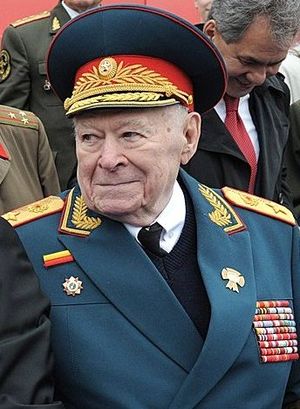Filipp Bobkov facts for kids
Quick facts for kids
Filipp Denisovich Bobkov
|
|
|---|---|

Bobkov in 2012
|
|
| Native name |
Филипп Денисович Бобков
|
| Nickname(s) | KGB's Brain |
| Born | 1 December 1925 Chervona Kam'yanka, Ukrainian Soviet Socialist Republic, Soviet Union (now Ukraine) |
| Died | 17 July 2019 (aged 93) Moscow, Russia |
| Allegiance | Soviet Union |
| Service/ |
Red Army (until 1945) NKGB (1945–1946) MGB (1946–1953) KGB (1953–1992) |
| Years of service | 1942–1992 |
| Rank | Army General |
| Commands held | Fifth Main Directorate of the KGB |
| Battles/wars | Second World War
|
| Awards | |
Filipp Denisovich Bobkov (Russian: Фили́пп Дени́сович Бобко́в; 1 December 1925 – 17 June 2019) was an important figure in the KGB, the main security agency of the Soviet Union. He was known for leading the part of the KGB that dealt with stopping people from disagreeing with the government. Many called him the "KGB's Brain" because of his influence.
Contents
Filipp Bobkov: A Life in Soviet Security
Filipp Bobkov started his career in the Soviet secret services in 1945. At that time, it was known as the People's Commissariat for State Security, or NKGB. He continued to work through many changes in the Soviet government. He served under different leaders and survived many shifts in power.
Early Career in Secret Services
Bobkov began his work in the secret services shortly after World War II. He worked for different security agencies as they changed names. These included the NKGB, the MGB, and finally the KGB. He became a very powerful person within these organizations. Some even said he was the real leader of the KGB in the 1970s and 1980s.
Creating Political Groups
Bobkov played a big role in setting up political groups that the KGB could control. One example was the Anti-Zionist Committee of the Soviet Public, created in 1983. There were also claims that he helped create the Liberal Democratic Party of Russia. However, Bobkov himself said he did not support creating fake political parties. He believed such groups would try to control people's ideas.
Dealing with Conflicts
Bobkov's official records show he was involved in solving conflicts between different ethnic groups in the Soviet Union. These included events like the Sumgait pogrom and the January Events in Lithuania. He also dealt with clashes in Uzbekistan and the Jeltoqsan protests. However, some people, like former politician Alexander Yakovlev, claimed Bobkov might have actually caused these conflicts. They believed this was done to show that the KGB was still needed.
The Perestroika Era
Bobkov claimed that he and his KGB colleagues helped create perestroika. Perestroika was a set of reforms in the Soviet Union in the 1980s. He said these changes were necessary for the Soviet Union to move forward.
Documents from the Stasi archives (East German secret police) show his views on major world events. In 1989, Bobkov reportedly told the Stasi Director that German reunification was a crazy idea. He also oversaw the movement of Communist Party money to banks outside the country. This happened before the 1991 Soviet coup d'état attempt. He ordered the creation of new businesses and banks run by KGB officers.
Life After the Soviet Union
Bobkov officially retired from the KGB in 1991. After retiring, he started a private security company called SB MOST Group. Many of his former KGB colleagues joined him there. This company worked with the Media Most company.
His daughter, Daria Bobkova, later became the head of the Spanish branch of Most-Bank. Bobkov also worked as a security advisor for Ruslan Khasbulatov. Khasbulatov was the speaker of the Russian Parliament at the time.
 | Tommie Smith |
 | Simone Manuel |
 | Shani Davis |
 | Simone Biles |
 | Alice Coachman |

